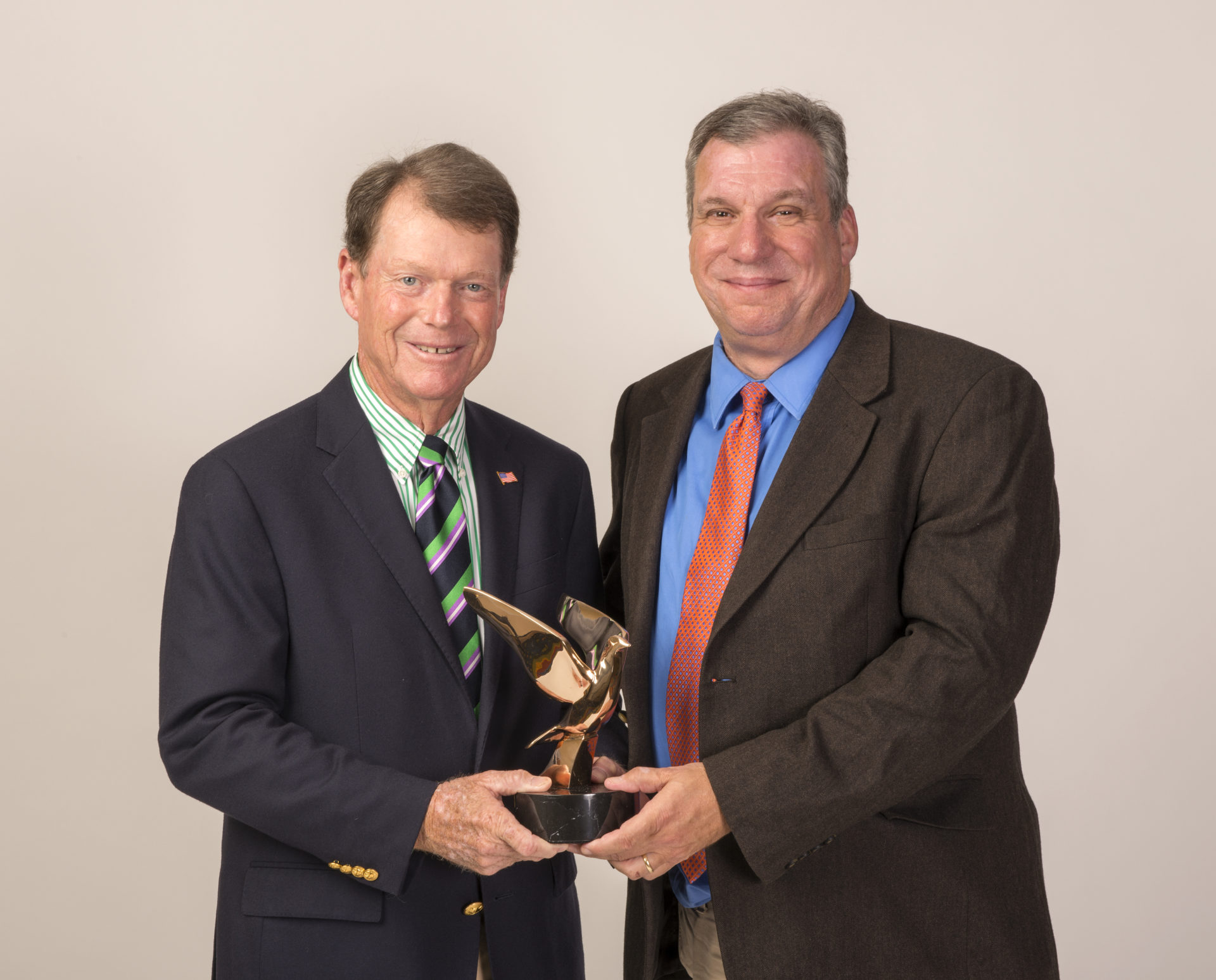WINNIE PALMER AWARD
Acknowledges an individual who has consistently given their time, energy and enthusiasm to those less fortunate. Named in honor of Winnie Palmer, who devoted much of her life to charity work for literacy programs and health care.
TOM WATSON
After Bruce Edwards, Tom Watson’s longtime caddie and friend, was diagnosed with Amyotrophic Lateral Sclerosis (ALS), a fatal neuromuscular disease, Watson made a vow.
“I promised Bruce I would continue to raise funds for research to try to find a cure for ALS,” Watson says, “and wouldn’t stop until a cure is found.”
Edwards died on April 8, 2004 at age 49. No cure has been discovered. But Watson remains committed to ALS research. “Without a doubt, it is frustrating that the researchers haven’t yet found a key to unlock the door,” Watson says. “But I have faith, total faith, that the key to that door will be found, and I certainly hope it is sooner rather than later.”
Watson’s commitment to ALS—also known as Lou Gehrig’s Disease, which claimed the New York Yankee in 1941—is part of a lifetime of helping others, for which the eight-time major champion is receiving the 2017 Winnie Palmer Award.
“I believe you help those who can’t help themselves,” says Watson. “That’s part of our charge as human beings. You see suffering or hardship and try to understand and offer a hand up. I’ve needed a hand up and received it.”
Winner of 39 tournaments on the PGA Tour and 14 on PGA Tour Champions and a member of the World Golf Hall of Fame, Watson, 67, raised more than $12 million for Children’s Mercy Hospital in his native Kansas City through an annual exhibition that brought dozens of golf greats to his hometown.
“We had a really good run for 25 years and raised a lot of money and awareness for the hospital,” Watson says. “Children’s Mercy was created to help sick kids get well whether they could pay for it or not. That was the whole charge of the hospital. It continues to this day to do that and is a wonderful element of our community.”
Funds raised from the Children’s Mercy Golf Classic benefitted various parts of the pediatric medical center, including newborn intensive care, operating rooms and cancer treatment. The Tom Watson Emergency Department opened in 2011, providing 24-hour care for children with immediate needs.
Watson also has helped young people since the inception of The First Tee of Greater Kansas City, serving as the chapter’s advisory board chairman. He has spent countless hours on the youth development program—that uses golf to teach life skills—conducting clinics, raising funds and promoting the virtues of character education.
In 2005, The year following Edwards’ death, Watson joined forces with best-selling author John Feinstein, who wrote Caddy for Life: The Bruce Edwards Story, to create the The Bruce Edwards Foundation for ALS Research. The foundation provides funds to medical research facilities dedicated to slowing the progression of and finding a cure for ALS.
The foundation’s Bruce Edwards ALS Celebrity Golf Classic has raised more than $5.5 million for the Robert Packard Center for ALS Research at Johns Hopkins. The ninth tournament will be held Oct. 16, 2017 at Congressional Country Club in Bethesda, Md. (For more information, bruceedwardsfoundation.org)
“John puts a lot of effort in on the tournament,” Watson says. “He uses his connections in the basketball world and the literary world. We’ll have a great group of celebrities to raise significant money.”
While an ALS cure has been elusive, a new drug—Radicava (edaravone)—to slow decline from the disease was approved by the U.S. Food and Drug Administration last month. “This is the first new treatment approved by the FDA for ALS in many years,” the FDA’s Dr. Eric Bastings said in a statement, “and we are pleased that people with ALS will now have an additional option.”
The Centers for Disease Control and Prevention estimates that approximately 12,000 to 15,000 Americans have ALS. Most die from respiratory failure within three to five years from the onset of symptoms.
“Regretfully a cure is not there yet,” Watson says. “The people in ALS research believe the help will probably come through a combination of drugs, much like what has happened with HIV. A combination of drugs worked, and they’ve refined that. That’s the type of result we’re hoping for.”
In the meantime, the work continues.
“I know what Bruce would say,” Watson says. “He’d say, ‘carry on,’ which is what he said when I made a double bogey. That’s what he would be saying right now.”
by Bill Fields
